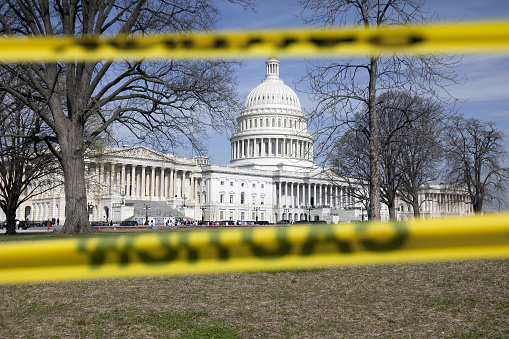What You Need to Know About Government Shutdowns

When there is a government shutdown, what does it mean for you? Which offices and agencies are operating as usual and which of them are shuttered until it’s over?
Here’s what you need to know:
What is a government shutdown?
A government shutdown occurs when a government's budget authorization expires, and lawmakers fail to pass new spending legislation or a budget for the upcoming fiscal year. As a result, government agencies and services are forced to cease operations until funding is restored. Shutdowns can affect various aspects of government, including public services, federal employees, and the economy.
What happens to government employees?
Federal employees are significantly affected by government shutdowns. When a government shutdown occurs due to a lack of funding or a budget impasse, federal agencies are forced to operate with limited resources, which in turn affects their employees. Here's what typically happens to federal employees during a government shutdown:
- Furloughs: Many federal employees are placed on furlough, which means they are temporarily laid off from their jobs. During this period, furloughed employees are not allowed to work, and they do not receive their regular paychecks. The duration of furloughs can vary depending on the length of the shutdown.
- Unpaid Leave: Furloughed federal employees do not receive a salary for the duration of the shutdown. This can create financial hardships for workers who rely on their government salaries to cover essential expenses such as rent or mortgage payments, utilities, and groceries.
-
Essential vs. Non-Essential Employees: Some federal employees are considered "essential" to national security, public safety, and critical government functions. Essential employees are required to work during a shutdown but may not receive their paychecks until the government reopens. Non-essential employees are the ones who are typically furloughed.
-
Pay Delays: Even essential employees who continue to work during a shutdown may not receive their pay on time. Instead, they may receive retroactive pay after the government reopens and funding is restored.
-
Uncertainty: Federal employees often face uncertainty and stress during a government shutdown. They may not know when they will return to work or when they will receive their next paycheck, making it challenging to plan their finances.
-
Backlog of Work: When employees return to work after a shutdown, they often face a backlog of tasks and responsibilities. Catching up on work can be overwhelming and may require additional time and effort.
-
Financial Hardships: For some federal employees, particularly those with lower salaries, a government shutdown can lead to financial difficulties, missed payments, and the need to seek temporary employment or government assistance.
Who is affected by a government shutdown?
Government shutdowns have a profound impact on a wide range of individuals, groups, and sectors within society. Here's a closer look at who is affected by these disruptions:
- Federal Employees: Federal workers are among the most directly affected by government shutdowns. Many of them are placed on furlough, meaning they are temporarily laid off without pay. These employees often face financial hardships as they struggle to meet their daily expenses, including mortgages, rent, and bills.
- Government Contractors: Numerous private companies rely on government contracts to provide goods and services. During a shutdown, these contracts may be delayed or temporarily halted, leading to revenue loss and potential layoffs within these businesses.
- Recipients of Government Benefits: Individuals who depend on government benefits, such as Social Security, Medicare, Medicaid, and food assistance programs, may experience delays or disruptions in receiving their payments or services.
- Small Businesses: Small businesses that rely on government loans or grants for their operations may encounter difficulties accessing the funds they need to sustain or grow their businesses.
- Travel and Tourism Industry: Government shutdowns often affect national parks, museums, and government-operated tourist attractions. This can lead to a decline in tourism, impacting local economies and businesses that rely on tourist traffic.
- Immigration Services: Those in the process of immigration or visa applications may face delays in their cases, causing uncertainty and frustration for individuals and families seeking legal immigration status.
- Veterans: Veterans who depend on government-operated healthcare facilities may experience delays in receiving medical services or obtaining medications during a shutdown.
- Scientific Research and Innovation: Government-funded research agencies, like the National Institutes of Health (NIH) and the National Aeronautics and Space Administration (NASA), may see delays in research projects, hindering scientific progress.
- Public Safety: Essential law enforcement agencies like the FBI, TSA, and Border Patrol may face challenges in maintaining their operations, potentially impacting national security and public safety.
- Economic Markets: Government shutdowns can cause uncertainty in financial markets, affecting investor confidence and potentially leading to stock market volatility.
- Government Services: Vital public services, including tax refunds, passport processing, and environmental inspections, may be delayed or limited during a shutdown, inconveniencing citizens.
- Local Communities: Shutdowns can have a ripple effect on local communities, particularly those near national parks or government installations. Reduced tourism and economic slowdowns can affect local businesses and tax revenues.
What do I do if there is a government shutdown?
In the event of a government shutdown, it's essential to assess your financial situation and prioritize your expenses. Our partners at GreenPath Financial Wellness can assist with debt management and financial counseling. GreenPath also provides invaluable resources, such as this budgeting worksheet and the Money Management Through Transitions Workbook. You can also explore available government assistance programs and consider part-time work options to supplement your income temporarily. Also, stay informed through reliable news sources, connect with local support organizations, and maintain your mental health during these stressful times.
Government shutdowns are not isolated events; they have a widespread impact on individuals, businesses, and communities across the nation. Understanding the far-reaching consequences of these disruptions highlights the importance of finding timely and effective solutions to budgetary and political disagreements in government.
« Return to "Blog Home"

